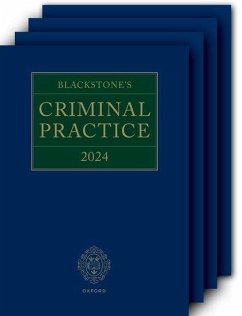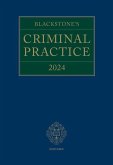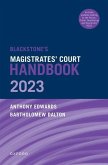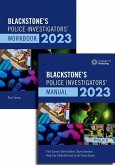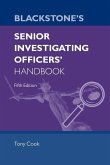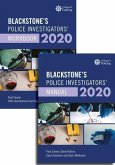Ormerod Cbe Kc (Hon) David, David Perry Kc
Blackstone's Criminal Practice 2024 (Main Work with All Supplements)
Ormerod Cbe Kc (Hon) David, David Perry Kc
Blackstone's Criminal Practice 2024 (Main Work with All Supplements)
- Broschiertes Buch
- Merkliste
- Auf die Merkliste
- Bewerten Bewerten
- Teilen
- Produkt teilen
- Produkterinnerung
- Produkterinnerung
Your single point of reference on criminal law and procedure, Blackstone's Criminal Practice is the only text to offer all the materials you need to practise with ease in the Crown and magistrates' courts. Its quality and accessibility make it an essential reference for anyone practising criminal law in England and Wales or qualifying to practise.
Andere Kunden interessierten sich auch für
![Blackstone's Criminal Practice 2024 Blackstone's Criminal Practice 2024]() Ormerod Cbe Kc (Hon) DavidBlackstone's Criminal Practice 2024553,99 €
Ormerod Cbe Kc (Hon) DavidBlackstone's Criminal Practice 2024553,99 €![Blackstone's Police Q&A 2024 Three Volume Pack Blackstone's Police Q&A 2024 Three Volume Pack]() Paul ConnorBlackstone's Police Q&A 2024 Three Volume Pack127,99 €
Paul ConnorBlackstone's Police Q&A 2024 Three Volume Pack127,99 €![Blackstone's Magistrates' Court Handbook 2023 and Blackstone's Youths in the Criminal Courts (October 2018 Edition) Pack Blackstone's Magistrates' Court Handbook 2023 and Blackstone's Youths in the Criminal Courts (October 2018 Edition) Pack]() Anthony EdwardsBlackstone's Magistrates' Court Handbook 2023 and Blackstone's Youths in the Criminal Courts (October 2018 Edition) Pack122,99 €
Anthony EdwardsBlackstone's Magistrates' Court Handbook 2023 and Blackstone's Youths in the Criminal Courts (October 2018 Edition) Pack122,99 €![Blackstone's Police Investigators Manual and Workbook 2023 Blackstone's Police Investigators Manual and Workbook 2023]() Paul ConnorBlackstone's Police Investigators Manual and Workbook 2023119,99 €
Paul ConnorBlackstone's Police Investigators Manual and Workbook 2023119,99 €![Blackstone's Senior Investigating Officers' Handbook Fifth Edition Blackstone's Senior Investigating Officers' Handbook Fifth Edition]() Tony CookBlackstone's Senior Investigating Officers' Handbook Fifth Edition76,99 €
Tony CookBlackstone's Senior Investigating Officers' Handbook Fifth Edition76,99 €![Blackstone's Handbook for Policing Students 2022 Blackstone's Handbook for Policing Students 2022]() Blackstone's Handbook for Policing Students 202254,99 €
Blackstone's Handbook for Policing Students 202254,99 €![Blackstone's Police Investigators' Manual and Workbook 2020 Blackstone's Police Investigators' Manual and Workbook 2020]() Paul ConnorBlackstone's Police Investigators' Manual and Workbook 2020126,99 €
Paul ConnorBlackstone's Police Investigators' Manual and Workbook 2020126,99 €-
-
-
Your single point of reference on criminal law and procedure, Blackstone's Criminal Practice is the only text to offer all the materials you need to practise with ease in the Crown and magistrates' courts. Its quality and accessibility make it an essential reference for anyone practising criminal law in England and Wales or qualifying to practise.
Hinweis: Dieser Artikel kann nur an eine deutsche Lieferadresse ausgeliefert werden.
Hinweis: Dieser Artikel kann nur an eine deutsche Lieferadresse ausgeliefert werden.
Produktdetails
- Produktdetails
- Verlag: Oxford University Press
- Thirty-Fourth edition
- Erscheinungstermin: 5. Januar 2024
- Englisch
- Abmessung: 239mm x 193mm x 155mm
- Gewicht: 3810g
- ISBN-13: 9780198892465
- ISBN-10: 0198892462
- Artikelnr.: 69192268
- Herstellerkennzeichnung
- Libri GmbH
- Europaallee 1
- 36244 Bad Hersfeld
- gpsr@libri.de
- Verlag: Oxford University Press
- Thirty-Fourth edition
- Erscheinungstermin: 5. Januar 2024
- Englisch
- Abmessung: 239mm x 193mm x 155mm
- Gewicht: 3810g
- ISBN-13: 9780198892465
- ISBN-10: 0198892462
- Artikelnr.: 69192268
- Herstellerkennzeichnung
- Libri GmbH
- Europaallee 1
- 36244 Bad Hersfeld
- gpsr@libri.de
David Ormerod CBE, KC (Hon), Bencher of Middle Temple, Professor of Criminal Justice, University College London, David Perry KC, Barrister, 6KBW College Hill
* Part A: Criminal Law
* A1: Actus reus: the external elements of an offence
* A2: Mens rea
* A3: General defences
* A4: Parties to offences
* A5: Inchoate offences
* A6: Corporate liability
* A7: Human rights
* A8: Territorial and extra-territorial jurisdiction
* A9: European Union law
* Part B: Offences
* B1: Homicide and related offences
* B2: Non-fatal offences against the person
* B3: Sexual offences
* B4: Theft, handling stolen goods and related offences
* B5: Fraud and blackmail
* B6: Falsification, forgery and counterfeiting
* B7: Company, commercial and insolvency offences
* B8: Damage to property
* B9: Offences affecting security
* B10: Terrorism, piracy and hijacking
* B11: Offences affecting public order
* B12: Offences relating to weapons
* B13: Offences affecting enjoyment of premises
* B14: Offences against the administration of justice
* B15: Corruption
* B16: Revenue, customs and social security offences
* B17: Offences involving misuse of computers
* B18: Offences involving writing, speech or publication
* B19: Offences related to drugs
* B20: Offences relating to dangerous dogs and animal welfare
* B21: Offences relating to money laundering and the proceeds of
criminal conduct
* B22: Modern slavery, trafficking and immigration offences
* Part C: Road Traffic Offences
* C1: Definitions and basic principles in road traffic cases
* C2: Procedure and evidence in road traffic cases
* C3: Offences relating to driving triable on indictment
* C4: Offences relating to documents triable on indictment
* C5: Drink-driving and drug-driving offences
* C6: Summary traffic offences
* C7: Sentencing
* C8: Schedules 2 and 3 to the Road Traffic Offenders Act 1988
* Part D: Procedure
* D1: Powers of investigation
* D2: The decision to prosecute and diversion
* D3: Courts, parties and abuse of process
* D4: Criminal Procedure Rules and case management
* D5: Starting a prosecution and preliminary proceedings in
magistrates' courts
* D6: Classification of offences and determining allocation (mode of
trial)
* D7: Bail
* D8: Assets recovery
* D9: Disclosure
* D10: Sending cases from the magistrates' court to the Crown Court
* D11: The indictment
* D12: Arraignment and pleas
* D13: Juries
* D14: Special measures and anonymity orders
* D15: Trial on indictment: general matters and pre-trial procedure
* D16: Trial on indictment: the prosecution case
* D17: Trial on indictment: the defence case
* D18: Trial on indictment: procedure between close of defence case and
retirement of jury
* D19: Trial on indictment: procedure relating to retirement of the
jury and verdict
* D20: Trial on indictment: sentencing procedure
* D21: Summary trial: general and preliminary matters
* D22: Summary trial: the course of the trial
* D23: Sentencing in the magistrates' court
* D24: Trial of children and young people
* D25: Behaviour orders
* D26: Appeal to the Court of Appeal (Criminal Division) following
trial on indictment
* D27: Procedure on appeal to the Court of Appeal (Criminal Division)
* D28: Reference to the Court of Appeal (Criminal Division) by the
Attorney-General and Criminal Cases Review Commission
* D29: Challenging decisions of magistrates' courts and of the Crown
Court in its appellate capacity
* D30: Appeals to the Supreme Court and the role of the Court of
Justice of the European Union and the European Court of Human Rights
* D31: Extradition
* D32: Public funding
* D33: Costs
* Part E: Sentencing
* E1: Sentencing code and sentencing guidelines
* E2: Sentencing: general provisions
* E3: Absolute and conditional discharge
* E4: Referral and reparation orders
* E5: Fines
* E6: Compensation orders
* E7: Restitution orders
* E8: Deprivation orders and forfeiture orders
* E9: Binding over
* E10: Orders against parents
* E11: Youth rehabilitation orders
* E12: Community orders
* E13: Custodial sentences: general provisions
* E14: Suspended sentences
* E15: Custodial sentences: detention and custody of offenders under 18
* E16: Life sentences, extended sentences, serious terrorism sentences
and custodial sentences for certain offenders of 'particular concern'
* E17: Mandatory life sentences
* E18: Minimum custodial sentences
* E19: Confiscation orders
* E20: Recommendation for deportation
* E21: Exclusions and disqualifications
* E22: Mentally disordered offenders
* E23: Notification requirements
* E24: Rehabilitation of offenders
* Part F: Evidence
* F1: General principles of evidence in criminal cases
* F2: Evidence unlawfully, improperly or unfairly obtained and the
discretion to exclude evidence
* F3: Burden and standard of proof and presumptions
* F4: Competence and compellability of witnesses and oaths and
affirmations
* F5: Corroboration and care warnings
* F6: Examination-in-chief
* F7: Cross-examination and re-examination
* F8: Documentary evidence and real evidence
* F9: Public policy
* F10: Privilege
* F11: Opinion evidence
* F12: Admissibility of previous verdicts and findings
* F13: Character evidence: evidence of bad character of accused
* F14: Character evidence: admissibility of evidence of accused's good
character
* F15: Character evidence: evidence of bad character of persons other
than the accused
* F16: The rule against hearsay: general principles
* F17: Exceptions to the rule against hearsay (excluding confessions)
* F18: The rule against hearsay: confessions
* F19: Evidence of identification
* F20: Inferences from silence and the non-production of evidence
* A1: Actus reus: the external elements of an offence
* A2: Mens rea
* A3: General defences
* A4: Parties to offences
* A5: Inchoate offences
* A6: Corporate liability
* A7: Human rights
* A8: Territorial and extra-territorial jurisdiction
* A9: European Union law
* Part B: Offences
* B1: Homicide and related offences
* B2: Non-fatal offences against the person
* B3: Sexual offences
* B4: Theft, handling stolen goods and related offences
* B5: Fraud and blackmail
* B6: Falsification, forgery and counterfeiting
* B7: Company, commercial and insolvency offences
* B8: Damage to property
* B9: Offences affecting security
* B10: Terrorism, piracy and hijacking
* B11: Offences affecting public order
* B12: Offences relating to weapons
* B13: Offences affecting enjoyment of premises
* B14: Offences against the administration of justice
* B15: Corruption
* B16: Revenue, customs and social security offences
* B17: Offences involving misuse of computers
* B18: Offences involving writing, speech or publication
* B19: Offences related to drugs
* B20: Offences relating to dangerous dogs and animal welfare
* B21: Offences relating to money laundering and the proceeds of
criminal conduct
* B22: Modern slavery, trafficking and immigration offences
* Part C: Road Traffic Offences
* C1: Definitions and basic principles in road traffic cases
* C2: Procedure and evidence in road traffic cases
* C3: Offences relating to driving triable on indictment
* C4: Offences relating to documents triable on indictment
* C5: Drink-driving and drug-driving offences
* C6: Summary traffic offences
* C7: Sentencing
* C8: Schedules 2 and 3 to the Road Traffic Offenders Act 1988
* Part D: Procedure
* D1: Powers of investigation
* D2: The decision to prosecute and diversion
* D3: Courts, parties and abuse of process
* D4: Criminal Procedure Rules and case management
* D5: Starting a prosecution and preliminary proceedings in
magistrates' courts
* D6: Classification of offences and determining allocation (mode of
trial)
* D7: Bail
* D8: Assets recovery
* D9: Disclosure
* D10: Sending cases from the magistrates' court to the Crown Court
* D11: The indictment
* D12: Arraignment and pleas
* D13: Juries
* D14: Special measures and anonymity orders
* D15: Trial on indictment: general matters and pre-trial procedure
* D16: Trial on indictment: the prosecution case
* D17: Trial on indictment: the defence case
* D18: Trial on indictment: procedure between close of defence case and
retirement of jury
* D19: Trial on indictment: procedure relating to retirement of the
jury and verdict
* D20: Trial on indictment: sentencing procedure
* D21: Summary trial: general and preliminary matters
* D22: Summary trial: the course of the trial
* D23: Sentencing in the magistrates' court
* D24: Trial of children and young people
* D25: Behaviour orders
* D26: Appeal to the Court of Appeal (Criminal Division) following
trial on indictment
* D27: Procedure on appeal to the Court of Appeal (Criminal Division)
* D28: Reference to the Court of Appeal (Criminal Division) by the
Attorney-General and Criminal Cases Review Commission
* D29: Challenging decisions of magistrates' courts and of the Crown
Court in its appellate capacity
* D30: Appeals to the Supreme Court and the role of the Court of
Justice of the European Union and the European Court of Human Rights
* D31: Extradition
* D32: Public funding
* D33: Costs
* Part E: Sentencing
* E1: Sentencing code and sentencing guidelines
* E2: Sentencing: general provisions
* E3: Absolute and conditional discharge
* E4: Referral and reparation orders
* E5: Fines
* E6: Compensation orders
* E7: Restitution orders
* E8: Deprivation orders and forfeiture orders
* E9: Binding over
* E10: Orders against parents
* E11: Youth rehabilitation orders
* E12: Community orders
* E13: Custodial sentences: general provisions
* E14: Suspended sentences
* E15: Custodial sentences: detention and custody of offenders under 18
* E16: Life sentences, extended sentences, serious terrorism sentences
and custodial sentences for certain offenders of 'particular concern'
* E17: Mandatory life sentences
* E18: Minimum custodial sentences
* E19: Confiscation orders
* E20: Recommendation for deportation
* E21: Exclusions and disqualifications
* E22: Mentally disordered offenders
* E23: Notification requirements
* E24: Rehabilitation of offenders
* Part F: Evidence
* F1: General principles of evidence in criminal cases
* F2: Evidence unlawfully, improperly or unfairly obtained and the
discretion to exclude evidence
* F3: Burden and standard of proof and presumptions
* F4: Competence and compellability of witnesses and oaths and
affirmations
* F5: Corroboration and care warnings
* F6: Examination-in-chief
* F7: Cross-examination and re-examination
* F8: Documentary evidence and real evidence
* F9: Public policy
* F10: Privilege
* F11: Opinion evidence
* F12: Admissibility of previous verdicts and findings
* F13: Character evidence: evidence of bad character of accused
* F14: Character evidence: admissibility of evidence of accused's good
character
* F15: Character evidence: evidence of bad character of persons other
than the accused
* F16: The rule against hearsay: general principles
* F17: Exceptions to the rule against hearsay (excluding confessions)
* F18: The rule against hearsay: confessions
* F19: Evidence of identification
* F20: Inferences from silence and the non-production of evidence
* Part A: Criminal Law
* A1: Actus reus: the external elements of an offence
* A2: Mens rea
* A3: General defences
* A4: Parties to offences
* A5: Inchoate offences
* A6: Corporate liability
* A7: Human rights
* A8: Territorial and extra-territorial jurisdiction
* A9: European Union law
* Part B: Offences
* B1: Homicide and related offences
* B2: Non-fatal offences against the person
* B3: Sexual offences
* B4: Theft, handling stolen goods and related offences
* B5: Fraud and blackmail
* B6: Falsification, forgery and counterfeiting
* B7: Company, commercial and insolvency offences
* B8: Damage to property
* B9: Offences affecting security
* B10: Terrorism, piracy and hijacking
* B11: Offences affecting public order
* B12: Offences relating to weapons
* B13: Offences affecting enjoyment of premises
* B14: Offences against the administration of justice
* B15: Corruption
* B16: Revenue, customs and social security offences
* B17: Offences involving misuse of computers
* B18: Offences involving writing, speech or publication
* B19: Offences related to drugs
* B20: Offences relating to dangerous dogs and animal welfare
* B21: Offences relating to money laundering and the proceeds of
criminal conduct
* B22: Modern slavery, trafficking and immigration offences
* Part C: Road Traffic Offences
* C1: Definitions and basic principles in road traffic cases
* C2: Procedure and evidence in road traffic cases
* C3: Offences relating to driving triable on indictment
* C4: Offences relating to documents triable on indictment
* C5: Drink-driving and drug-driving offences
* C6: Summary traffic offences
* C7: Sentencing
* C8: Schedules 2 and 3 to the Road Traffic Offenders Act 1988
* Part D: Procedure
* D1: Powers of investigation
* D2: The decision to prosecute and diversion
* D3: Courts, parties and abuse of process
* D4: Criminal Procedure Rules and case management
* D5: Starting a prosecution and preliminary proceedings in
magistrates' courts
* D6: Classification of offences and determining allocation (mode of
trial)
* D7: Bail
* D8: Assets recovery
* D9: Disclosure
* D10: Sending cases from the magistrates' court to the Crown Court
* D11: The indictment
* D12: Arraignment and pleas
* D13: Juries
* D14: Special measures and anonymity orders
* D15: Trial on indictment: general matters and pre-trial procedure
* D16: Trial on indictment: the prosecution case
* D17: Trial on indictment: the defence case
* D18: Trial on indictment: procedure between close of defence case and
retirement of jury
* D19: Trial on indictment: procedure relating to retirement of the
jury and verdict
* D20: Trial on indictment: sentencing procedure
* D21: Summary trial: general and preliminary matters
* D22: Summary trial: the course of the trial
* D23: Sentencing in the magistrates' court
* D24: Trial of children and young people
* D25: Behaviour orders
* D26: Appeal to the Court of Appeal (Criminal Division) following
trial on indictment
* D27: Procedure on appeal to the Court of Appeal (Criminal Division)
* D28: Reference to the Court of Appeal (Criminal Division) by the
Attorney-General and Criminal Cases Review Commission
* D29: Challenging decisions of magistrates' courts and of the Crown
Court in its appellate capacity
* D30: Appeals to the Supreme Court and the role of the Court of
Justice of the European Union and the European Court of Human Rights
* D31: Extradition
* D32: Public funding
* D33: Costs
* Part E: Sentencing
* E1: Sentencing code and sentencing guidelines
* E2: Sentencing: general provisions
* E3: Absolute and conditional discharge
* E4: Referral and reparation orders
* E5: Fines
* E6: Compensation orders
* E7: Restitution orders
* E8: Deprivation orders and forfeiture orders
* E9: Binding over
* E10: Orders against parents
* E11: Youth rehabilitation orders
* E12: Community orders
* E13: Custodial sentences: general provisions
* E14: Suspended sentences
* E15: Custodial sentences: detention and custody of offenders under 18
* E16: Life sentences, extended sentences, serious terrorism sentences
and custodial sentences for certain offenders of 'particular concern'
* E17: Mandatory life sentences
* E18: Minimum custodial sentences
* E19: Confiscation orders
* E20: Recommendation for deportation
* E21: Exclusions and disqualifications
* E22: Mentally disordered offenders
* E23: Notification requirements
* E24: Rehabilitation of offenders
* Part F: Evidence
* F1: General principles of evidence in criminal cases
* F2: Evidence unlawfully, improperly or unfairly obtained and the
discretion to exclude evidence
* F3: Burden and standard of proof and presumptions
* F4: Competence and compellability of witnesses and oaths and
affirmations
* F5: Corroboration and care warnings
* F6: Examination-in-chief
* F7: Cross-examination and re-examination
* F8: Documentary evidence and real evidence
* F9: Public policy
* F10: Privilege
* F11: Opinion evidence
* F12: Admissibility of previous verdicts and findings
* F13: Character evidence: evidence of bad character of accused
* F14: Character evidence: admissibility of evidence of accused's good
character
* F15: Character evidence: evidence of bad character of persons other
than the accused
* F16: The rule against hearsay: general principles
* F17: Exceptions to the rule against hearsay (excluding confessions)
* F18: The rule against hearsay: confessions
* F19: Evidence of identification
* F20: Inferences from silence and the non-production of evidence
* A1: Actus reus: the external elements of an offence
* A2: Mens rea
* A3: General defences
* A4: Parties to offences
* A5: Inchoate offences
* A6: Corporate liability
* A7: Human rights
* A8: Territorial and extra-territorial jurisdiction
* A9: European Union law
* Part B: Offences
* B1: Homicide and related offences
* B2: Non-fatal offences against the person
* B3: Sexual offences
* B4: Theft, handling stolen goods and related offences
* B5: Fraud and blackmail
* B6: Falsification, forgery and counterfeiting
* B7: Company, commercial and insolvency offences
* B8: Damage to property
* B9: Offences affecting security
* B10: Terrorism, piracy and hijacking
* B11: Offences affecting public order
* B12: Offences relating to weapons
* B13: Offences affecting enjoyment of premises
* B14: Offences against the administration of justice
* B15: Corruption
* B16: Revenue, customs and social security offences
* B17: Offences involving misuse of computers
* B18: Offences involving writing, speech or publication
* B19: Offences related to drugs
* B20: Offences relating to dangerous dogs and animal welfare
* B21: Offences relating to money laundering and the proceeds of
criminal conduct
* B22: Modern slavery, trafficking and immigration offences
* Part C: Road Traffic Offences
* C1: Definitions and basic principles in road traffic cases
* C2: Procedure and evidence in road traffic cases
* C3: Offences relating to driving triable on indictment
* C4: Offences relating to documents triable on indictment
* C5: Drink-driving and drug-driving offences
* C6: Summary traffic offences
* C7: Sentencing
* C8: Schedules 2 and 3 to the Road Traffic Offenders Act 1988
* Part D: Procedure
* D1: Powers of investigation
* D2: The decision to prosecute and diversion
* D3: Courts, parties and abuse of process
* D4: Criminal Procedure Rules and case management
* D5: Starting a prosecution and preliminary proceedings in
magistrates' courts
* D6: Classification of offences and determining allocation (mode of
trial)
* D7: Bail
* D8: Assets recovery
* D9: Disclosure
* D10: Sending cases from the magistrates' court to the Crown Court
* D11: The indictment
* D12: Arraignment and pleas
* D13: Juries
* D14: Special measures and anonymity orders
* D15: Trial on indictment: general matters and pre-trial procedure
* D16: Trial on indictment: the prosecution case
* D17: Trial on indictment: the defence case
* D18: Trial on indictment: procedure between close of defence case and
retirement of jury
* D19: Trial on indictment: procedure relating to retirement of the
jury and verdict
* D20: Trial on indictment: sentencing procedure
* D21: Summary trial: general and preliminary matters
* D22: Summary trial: the course of the trial
* D23: Sentencing in the magistrates' court
* D24: Trial of children and young people
* D25: Behaviour orders
* D26: Appeal to the Court of Appeal (Criminal Division) following
trial on indictment
* D27: Procedure on appeal to the Court of Appeal (Criminal Division)
* D28: Reference to the Court of Appeal (Criminal Division) by the
Attorney-General and Criminal Cases Review Commission
* D29: Challenging decisions of magistrates' courts and of the Crown
Court in its appellate capacity
* D30: Appeals to the Supreme Court and the role of the Court of
Justice of the European Union and the European Court of Human Rights
* D31: Extradition
* D32: Public funding
* D33: Costs
* Part E: Sentencing
* E1: Sentencing code and sentencing guidelines
* E2: Sentencing: general provisions
* E3: Absolute and conditional discharge
* E4: Referral and reparation orders
* E5: Fines
* E6: Compensation orders
* E7: Restitution orders
* E8: Deprivation orders and forfeiture orders
* E9: Binding over
* E10: Orders against parents
* E11: Youth rehabilitation orders
* E12: Community orders
* E13: Custodial sentences: general provisions
* E14: Suspended sentences
* E15: Custodial sentences: detention and custody of offenders under 18
* E16: Life sentences, extended sentences, serious terrorism sentences
and custodial sentences for certain offenders of 'particular concern'
* E17: Mandatory life sentences
* E18: Minimum custodial sentences
* E19: Confiscation orders
* E20: Recommendation for deportation
* E21: Exclusions and disqualifications
* E22: Mentally disordered offenders
* E23: Notification requirements
* E24: Rehabilitation of offenders
* Part F: Evidence
* F1: General principles of evidence in criminal cases
* F2: Evidence unlawfully, improperly or unfairly obtained and the
discretion to exclude evidence
* F3: Burden and standard of proof and presumptions
* F4: Competence and compellability of witnesses and oaths and
affirmations
* F5: Corroboration and care warnings
* F6: Examination-in-chief
* F7: Cross-examination and re-examination
* F8: Documentary evidence and real evidence
* F9: Public policy
* F10: Privilege
* F11: Opinion evidence
* F12: Admissibility of previous verdicts and findings
* F13: Character evidence: evidence of bad character of accused
* F14: Character evidence: admissibility of evidence of accused's good
character
* F15: Character evidence: evidence of bad character of persons other
than the accused
* F16: The rule against hearsay: general principles
* F17: Exceptions to the rule against hearsay (excluding confessions)
* F18: The rule against hearsay: confessions
* F19: Evidence of identification
* F20: Inferences from silence and the non-production of evidence

